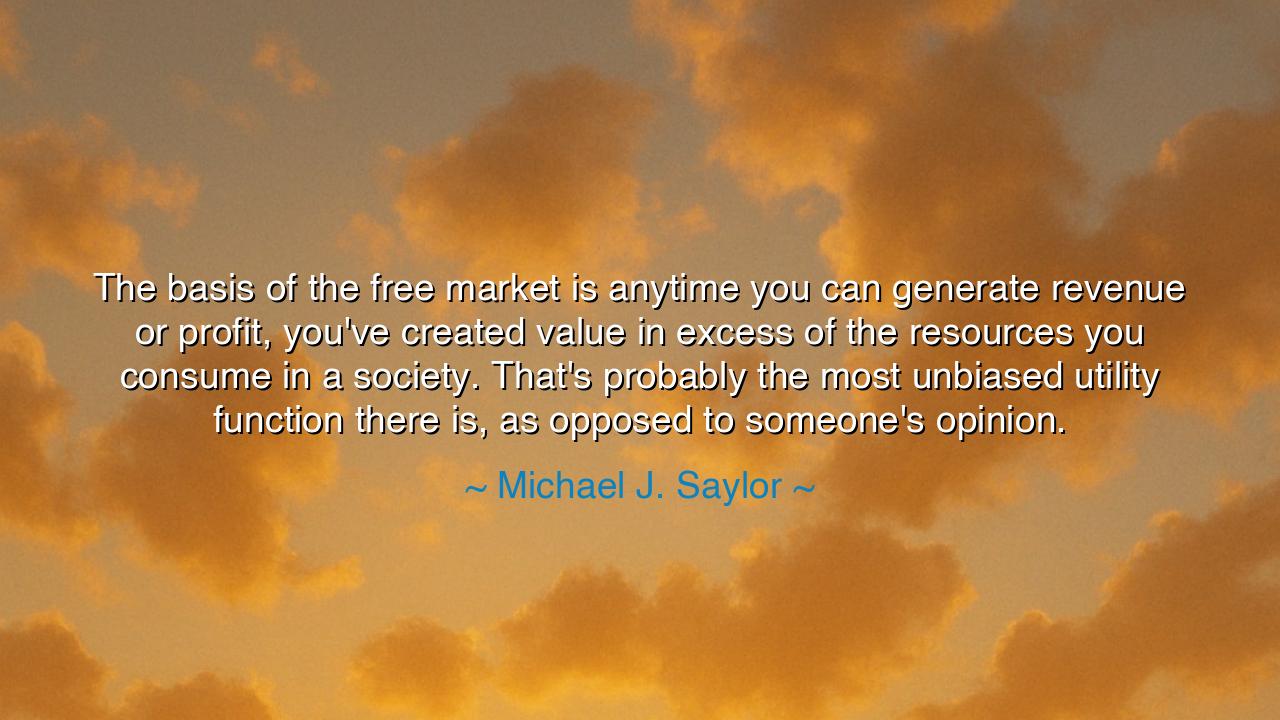
The basis of the free market is anytime you can generate revenue
The basis of the free market is anytime you can generate revenue or profit, you've created value in excess of the resources you consume in a society. That's probably the most unbiased utility function there is, as opposed to someone's opinion.






Hear the words of Michael J. Saylor, who spoke not with the tongue of a poet but with the clarity of a merchant-philosopher: “The basis of the free market is anytime you can generate revenue or profit, you’ve created value in excess of the resources you consume in a society. That’s probably the most unbiased utility function there is, as opposed to someone’s opinion.” Within these lines lies a vision both practical and profound: that the measure of worth is not in speeches or sentiment, but in the balance between what one takes and what one gives.
The free market, as Saylor describes, is not merely a place of exchange, but a living tribunal of value. When a man or woman produces something that others willingly pay for, they have added to the common store of wealth. They have given more than they consumed, and so the scales of society tip toward abundance. This, he argues, is an unbiased function, for it does not ask whether a king approves or whether an elder praises; it asks only whether the creation sustains itself, whether others find it worth their coin, their trust, their time.
History testifies to this truth. In the days of Florence, the bankers of the Medici and the artisans of the Renaissance transformed their city into a beacon of light. They did not wait for kings to anoint them nor for priests to approve; they created art, architecture, and finance that others willingly embraced. The revenues they generated did not merely enrich themselves—they built cathedrals, funded scholars, and gave birth to genius. Here the principle shone clearly: where profit was earned honestly, value multiplied beyond the resources consumed, and society flourished.
Yet Saylor’s words also carry a warning. For there are times when profit is drawn not from creation but from exploitation, when men reap by consuming more than they give back. History shows this too—in the monopolies of empire, in the reckless feasting of oligarchs, in the devastations of industries that stripped the earth without replenishment. Such revenue is not true value; it is theft against the future. Thus, the free market must be guided by conscience, else the balance it promises may be perverted into ruin.
The power of this teaching lies in its call to humility. Opinions may be swayed by bias, by favoritism, by ideology. But the utility function of the market is indifferent to pride. It asks of each: have you created something that endures? Have you given to others something greater than what you have taken? If so, then your work stands as true value, tested not by opinion, but by the collective judgment of society itself.
The lesson, O seeker, is this: do not measure your life only by praise or recognition, but by the value you create beyond yourself. Ask whether your work leaves the world richer than you found it—whether in goods, in wisdom, or in beauty. Profit is not merely gold, but the mark that your contribution has been acknowledged as useful, sustaining, worthy. Let your labor be a fountain that nourishes, not a fire that consumes.
Therefore, in your own life, seek not only to earn, but to create. Build things that endure, offer services that uplift, share knowledge that strengthens others. When you consume resources—time, energy, materials—be sure to give back more than you take. This is the truest measure of a fruitful life, and the most enduring foundation of a flourishing society.
So remember the wisdom of Saylor: the free market, when honest, is the great mirror of human endeavor. It rewards creation, punishes waste, and reflects the balance of give and take. It is not perfect, but it is more steadfast than opinion, more enduring than praise. To create true value is to step into harmony with this law, and in doing so, to leave behind a legacy that outlives gold and honors the very fabric of civilization.






AAdministratorAdministrator
Welcome, honored guests. Please leave a comment, we will respond soon